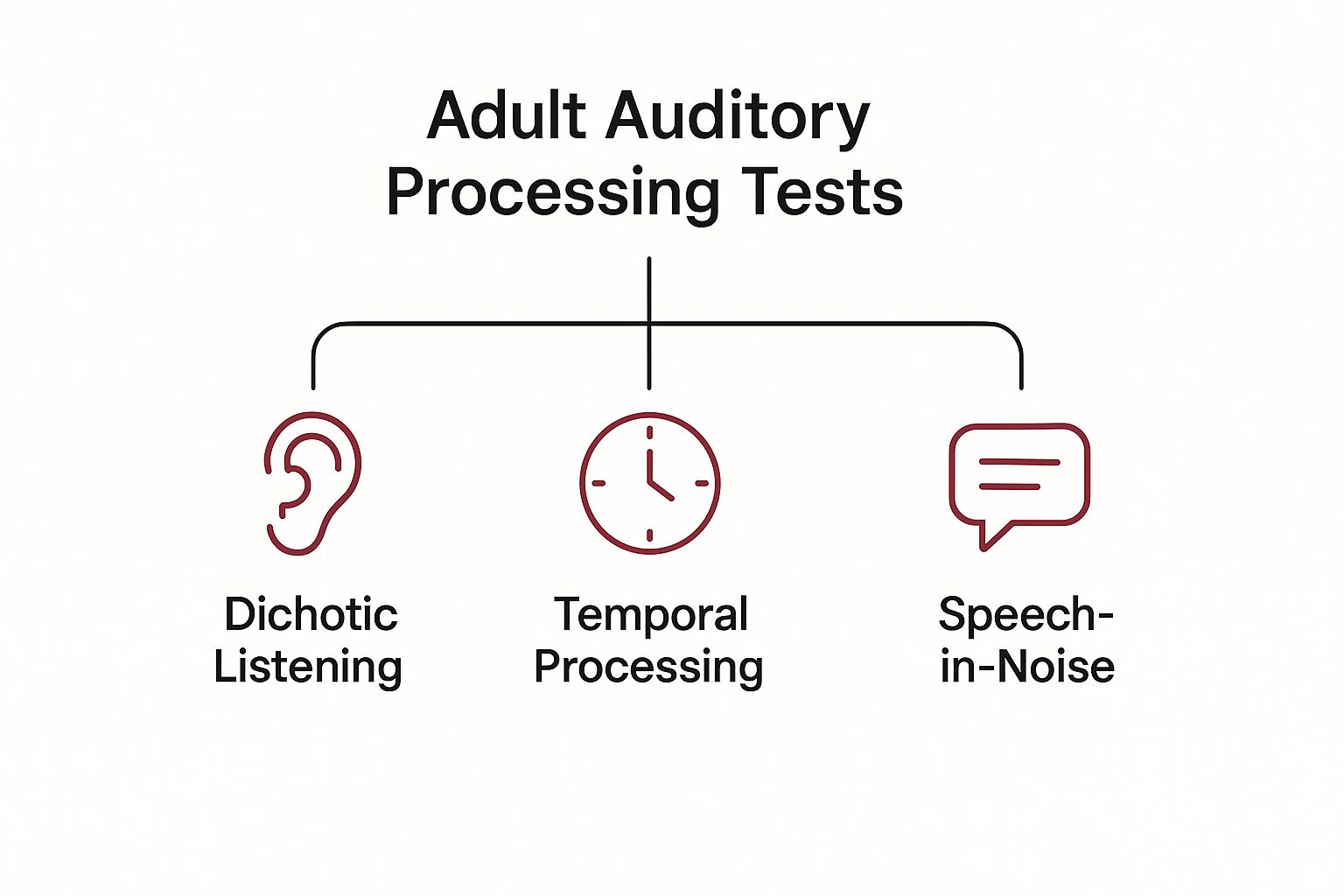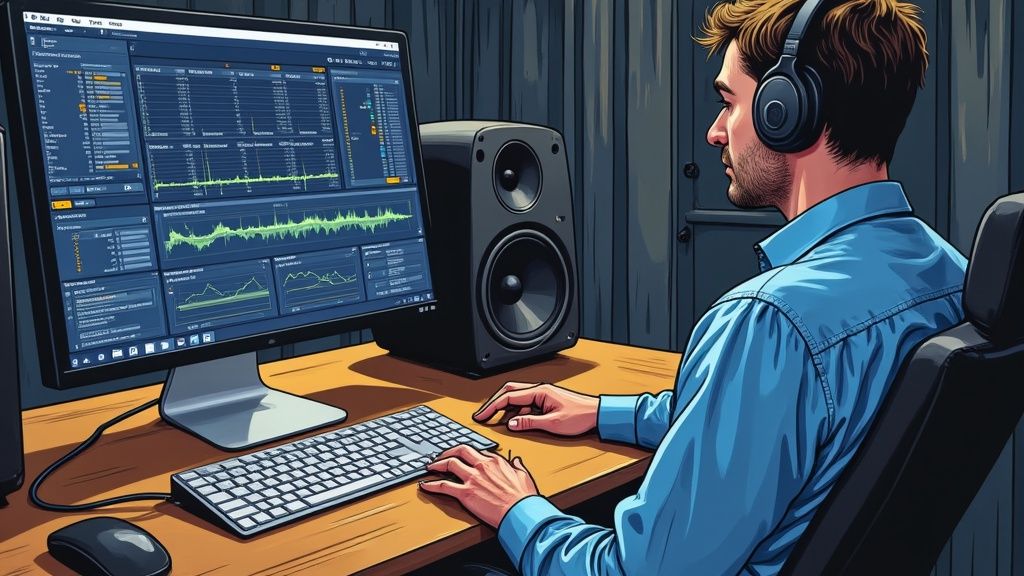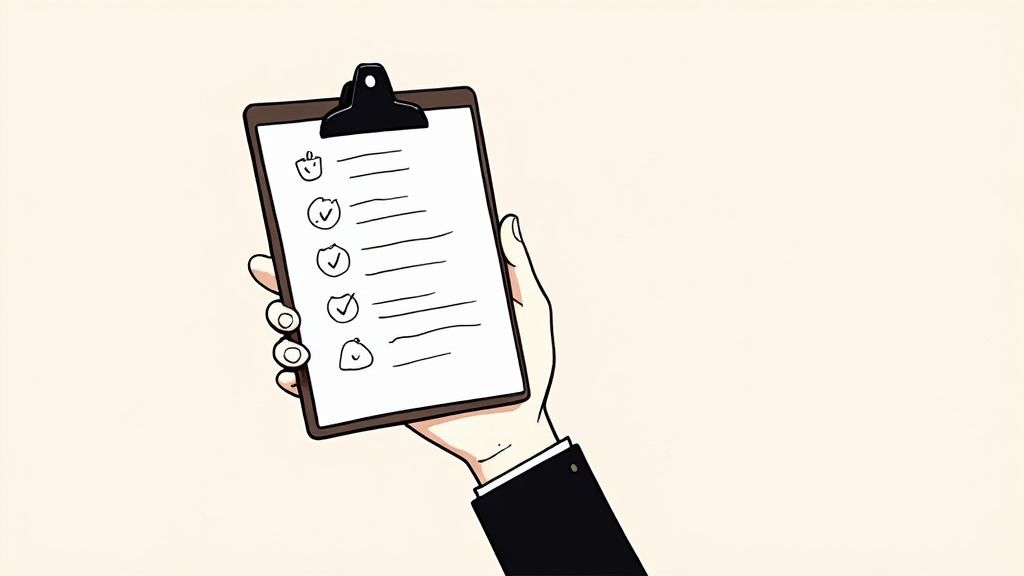It’s a strange and frustrating feeling. You can hear the words someone is saying, yet you completely miss the meaning. What’s even more confusing is when a standard hearing test comes back saying your hearing is perfectly normal.
This disconnect—hearing but not understanding—is a hallmark of Auditory Processing Disorder (APD). It’s a condition where the problem isn’t in your ears, but in how your brain makes sense of sound.
Do You Hear Words But Miss the Meaning?
Have you ever left a loud restaurant feeling totally wiped out? Not from the food, but from the sheer mental effort it took just to keep up with a single conversation. Or maybe you find yourself constantly asking "what?" in meetings, even when you're trying your best to pay attention. For adults with APD, this is a daily reality.
Think of it like this: your ears are high-quality microphones, picking up every sound around you with crystal clarity. They're doing their job perfectly. The issue is with the sound engineer—your brain.
An adult with APD has a brain that’s like an overwhelmed sound engineer. It can't seem to filter out the background chatter, isolate the main speaker's voice, and process it all in real-time. The result is a confusing, jumbled mess of an audio track.
This "sound engineering" problem shows up in some really challenging ways that have nothing to do with traditional hearing loss. You might find yourself:
- Struggling in Noisy Places: What should be an enjoyable family dinner or a team lunch at a cafe becomes a source of stress and anxiety.
- Missing Key Details: You might catch bits and pieces of spoken directions but lose the most important part, leading to constant misunderstandings.
- Feeling Mentally Drained: The nonstop effort to decode what people are saying is incredibly taxing. It can leave you feeling completely exhausted after social events or even long phone calls.
These experiences aren't a sign of poor attention or low intelligence. They are real, valid challenges that come from how your brain handles auditory information. In fact, Auditory Processing Disorder is a recognized clinical condition that affects adults. A 2023 report from the World Health Organization (WHO) even highlighted that APD impairs sound processing in difficult listening environments, even when hearing tests show normal results. You can read more about APD as a distinct condition on PMC.
Recognizing this disconnect is the crucial first step. The next is understanding that a specialized auditory processing test for adults is the only way to get real answers and start moving forward.
Recognizing the Signs of Adult APD
Before you even think about an auditory processing test for adults, it’s worth asking if your day-to-day life reflects the common signs of APD. This is more than just a checklist. It's about recognizing those moments where your brain seems to struggle to keep up with the sounds around you.
Do you find yourself constantly asking, "What?" even when you know you heard the person speaking? This is a classic APD scenario. The sound makes it to your ears just fine, but the meaning gets scrambled somewhere on the journey to your brain. It's not an attention problem; it’s a specific hiccup in how your brain decodes speech.
This struggle is often thrown into sharp relief the moment background noise joins the party. Trying to follow one conversation in a loud restaurant or a busy office can feel like a marathon, leaving you exhausted and feeling left out.
Common Scenarios and Symptoms
APD often shows up in ways that are easily mistaken for something else—like being distracted, forgetful, or even rude. Understanding these specific challenges is the first step to realizing that your struggles are real and have a neurological root.
Here are some common signs you might be experiencing:
- Difficulty with Fast Talkers: Trying to follow someone who speaks quickly can feel impossible. It’s like your brain can’t process the words fast enough to keep up.
- Trouble Following Spoken Directions: You might understand each step as it's said, but when you try to recall a multi-step sequence you just heard, it’s a total blank.
- Phone Call Fatigue: Since phone calls strip away all visual cues like lip-reading and body language, they demand immense concentration. It’s no wonder they can feel so draining.
- Mishearing Words: Frequently mistaking similar-sounding words for one another—like hearing "coat" when someone said "boat"—is a textbook indicator of a processing snag.
This isn't about intelligence or not trying hard enough. People with APD often have to put in a massive amount of extra effort in listening situations just to stay in the conversation, which can lead to social anxiety and burnout.
APD in the Adult Population
While APD is often talked about in kids, it’s becoming more and more recognized in adults. Many adults have likely lived with it for years, developing clever workarounds and coping strategies without ever knowing the real reason for their listening difficulties.
Studies show that while APD is diagnosed less often in adults than in children, it's a very real issue for those who seek help for hearing problems but pass standard hearing tests with flying colors. In fact, research suggests that among adults referred to audiology clinics with these exact symptoms, about 0.9% have APD. This really underscores the need for a proper assessment when hearing seems fine, but understanding is a constant battle. You can learn more about APD demographics at Hearing Health Foundation.
If these patterns sound familiar, it might be time to seek a formal evaluation. An auditory processing test for adults can finally provide the clarity you need to move from confusion and frustration toward effective, real-world solutions.
What to Expect During Your APD Evaluation
Walking into an audiologist’s office for an auditory processing test for adults can feel a bit nerve-wracking, but knowing what’s coming can make all the difference. The first thing to know is there isn’t one single, scary "APD test." Instead, you’ll go through what’s called a test battery—a series of distinct listening tasks inside a quiet, soundproof booth.
Each task is specifically designed to challenge a different auditory skill. Think of it as creating a detailed map of how your brain processes sound. It’s not about passing or failing; it's about identifying your unique auditory strengths and the specific spots where things get tricky. It's less like a final exam and more like a diagnostic workout for your brain's listening pathways.
The Auditory Skills Under the Microscope
The evaluation isolates different parts of listening that most of us take for granted. It goes way beyond a standard hearing test to see how well your brain can filter, separate, and make sense of complex sound information. The whole point is to pinpoint exactly where the communication breakdown is happening between your ears and your brain.
This diagram shows the main categories of tests you'll likely encounter during an evaluation.
This visual breaks down how the test battery targets different neurological listening skills, from separating sounds to processing their timing and order.
Demystifying the Test Battery Components
So, what do these tests actually feel like? Let's break down the "why" behind each task without getting bogged down in complex medical terms.
The audiologist will administer a series of tests that fall into several key categories. Here’s a simple breakdown of what to expect:
Common Components of an Adult APD Test Battery
| Test Category | What It Measures | Real-World Example |
|---|---|---|
| Dichotic Listening | How well the two sides of your brain work together to process different sounds coming into each ear. | Hearing "cowboy" in your right ear and "baseball" in your left at the same time and being asked to repeat both. |
| Speech-in-Noise | Your ability to tune into a voice and filter out distracting background noise. | Trying to follow a conversation with a friend in a loud, bustling coffee shop. |
| Temporal Processing | How well your brain detects the timing, rhythm, and order of sounds. | Noticing the subtle difference in the timing of sounds that changes "bill" to "pill." |
These tests work together to build a complete profile of your auditory processing abilities, highlighting specific areas of difficulty.
Let’s look a little closer at what you’ll be doing.
-
Dichotic Listening Tests: Imagine you're wearing headphones and hear one word in your left ear ("baseball") and a totally different word in your right ear ("cowboy") at the exact same moment. You might be asked to repeat both words or just the word you heard in one specific ear. This tests binaural integration and separation—basically, how well your brain's two halves are communicating and if you can focus on one ear while ignoring the other.
-
Speech-in-Noise Tests: This is the ultimate real-world simulation. You'll listen to sentences or words while background noise, like the chatter of a busy café, is played at the same time. This directly measures your skill at filtering out distractions to focus on a speaker's voice, which is often the biggest challenge for adults with APD.
-
Temporal Processing Tests: These tests are all about your brain's ability to handle the timing of sounds. You might listen to a series of tones and have to identify their pitch pattern (like high-low-high) or detect a tiny gap of silence between two quick sounds. This skill is absolutely essential for understanding the rhythm and flow of speech.
Understanding the purpose behind each listening task can transform the evaluation from a stressful test into an interesting process of discovery. You are actively helping the audiologist build a clear picture of your auditory profile.
Because APD symptoms can sometimes overlap with other conditions, getting a complete picture of your neurological profile is incredibly helpful. For example, if you're also wondering about attention-related challenges, it might be beneficial to learn more about the process for comprehensive ADHD testing and evaluations to see if that is a relevant path for you. By isolating specific auditory deficits, the auditory processing test for adults provides the clarity needed to create an effective management plan tailored just for you.
How to Prepare for Your APD Test
Preparing for your auditory processing test for adults is about more than just showing up on time. A few simple steps beforehand can make a world of difference, helping ensure the results are as accurate as possible. This gives you and your audiologist the clearest picture of what’s really going on with your hearing.
Think of it like this: your brain is an athlete about to compete in a big event. You wouldn't try to run a marathon on no sleep, right? The same logic applies here. The goal is to walk in feeling rested and mentally ready so your brain can perform at its usual level.
Getting a good night's sleep is non-negotiable. It's also a good idea to avoid things that could wear out your auditory system the day before, like going to a loud concert or working a long shift in a noisy factory.
Arming Your Audiologist with Information
Beyond getting enough rest, a little mental prep work goes a long way. Your audiologist is going to have a lot of questions, and having your thoughts organized ahead of time will make your session much more productive.
Before your appointment, spend some time thinking about your experiences and jotting them down. Try to create a list of very specific examples of your listening struggles. Instead of just saying, "I have a hard time in noisy places," get more descriptive:
- "I completely lose the plot of a TV show if someone starts talking in the same room."
- "In team meetings, I miss crucial action items if several people are speaking at once."
- "I feel totally wiped out after a 30-minute phone call if I can't see the person's face."
It’s also helpful to write down a brief medical history. Note any big events like past head injuries, chronic ear infections, or any neurological conditions you have. This context helps the audiologist see the full picture.
Questionnaires are a vital part of the APD evaluation process. They help clinicians identify listening problems that standard hearing tests might miss and determine which specific auditory tests are most relevant for you. For adults with normal audiograms who still struggle to hear, this initial information gathering is essential for an accurate diagnosis.
This prep work provides your audiologist with invaluable qualitative data that fills in the gaps left by the quantitative test results. And since APD symptoms can sometimes overlap with attention-related challenges, it can be helpful to explore therapies like Cognitive Behavioral Therapy (CBT) for managing ADHD symptoms, which focuses on building practical coping strategies.
Decoding Your Test Results and Diagnosis
After going through an auditory processing test for adults, getting the clinical report can feel a bit like trying to read a foreign language. It’s usually packed with technical terms and data points that don't mean much on their own.
Here's the most important thing to remember: an APD diagnosis doesn't come from a single low score. It’s not about “failing” one part of the test.
Instead, your audiologist is looking for a consistent pattern of difficulty across all the different tests. Think of your results as a detailed roadmap of your brain's auditory pathways. One or two rough patches might not be a big deal, but a clear pattern of breakdowns across multiple tests shows exactly where communication is getting lost.
Getting an APD diagnosis finally gives a name to the listening struggles you've been experiencing. For many people, that validation is the first—and most powerful—step toward finding real solutions.
Translating Technical Terms into Real-World Meaning
Your report will likely point out specific types of auditory deficits. The goal isn’t to get lost in the jargon but to connect these terms to what’s actually happening in your day-to-day life.
Let’s break down a few common findings you might see:
-
Auditory Closure Deficit: This is a fancy way of saying your brain struggles to "fill in the blanks" when a word is muffled or distorted. In real life, it’s why you have a hard time understanding someone who mumbles or is talking on a bad phone connection.
-
Binaural Separation Deficit: This means you have trouble focusing on what someone is saying in one ear while tuning out competing noise in the other. It’s the classic APD challenge—trying to follow one conversation at a noisy restaurant is nearly impossible.
-
Temporal Processing Deficit: This is a weakness in how your brain perceives the timing and order of sounds. It can cause you to mishear similar-sounding words (like "coat" versus "boat") because you miss the tiny timing cues that make them different.
An APD report isn’t a label of failure; it is a personalized guide. It highlights the specific auditory skills that need strengthening and provides the blueprint for creating a targeted management plan that works for you.
Each of these findings points to a specific weak spot in your brain’s sound-processing system. Your results might show a problem in just one area or a mix of several.
This detailed profile is what makes a personalized management plan possible. It takes you from a place of general frustration to having specific, actionable knowledge about your unique auditory profile. Understanding why you struggle is the foundation for everything that comes next.
Your Action Plan After an APD Diagnosis
Getting a diagnosis from your auditory processing test for adults isn't the end of the road. Think of it as the starting line. Now you have the map you need to build a personalized action plan that targets your specific listening challenges.
The whole point is to reduce the massive effort you've been putting into just listening every day and to get your confidence back. A good management plan usually brings three key things together to support your brain.
Building Your APD Management Toolkit
Your action plan will be a mix of tweaking your environment, learning new habits, and directly training your auditory skills. This well-rounded approach makes sure you have the right tools for any situation.
The main strategies fit into a few categories:
-
Environmental Modifications: This is all about making small, smart changes to your surroundings to make listening less of a struggle. For example, when you’re out for dinner, ask for a quiet booth instead of a table in the middle of a loud room. At work, you might ask to move your desk away from the noisy hallway.
-
Compensatory Strategies: These are conscious things you can do to give your brain a helping hand. It could be as simple as asking people to face you when they talk, sending a quick follow-up email to confirm details you heard, or using an agenda in meetings so you can follow along visually.
Don't think of these strategies as crutches. They’re smart, proactive tools. Taking these practical steps gives your brain the best possible chance to succeed, no matter how noisy the world gets.
Direct Therapy and Assistive Technology
While the strategies above help you manage APD in the moment, therapy and technology are about improving your core skills and giving you some powerful backup.
Auditory Training Programs are like a gym for your brain’s listening pathways. These are usually computer-based programs filled with exercises designed to strengthen the specific auditory skills that your test showed were weak, like filtering out background noise.
Assistive Listening Devices (ALDs) can be total game-changers, too. A remote microphone system, for instance, can send a speaker's voice directly to your earbuds. This cuts right through the background noise in tough environments like a lecture hall or a big company meeting.
Because APD sometimes shows up alongside other neurodivergent traits, it helps to explore a wide range of support. You can find a lot of useful strategies in our adult ADHD resources, which are often packed with great tips for organization and communication. By combining these different approaches, you can build a solid plan that helps you communicate with way more ease and confidence.
Your Questions About Adult APD Testing, Answered
Once you suspect you might have APD, a flood of practical questions usually follows. Let's walk through some of the most common concerns about getting an auditory processing test for adults.
How Do I Find an Audiologist Who Tests Adults for APD?
Finding the right professional is the crucial first step. A good starting point is a simple online search for "audiologist adult auditory processing" in your city. You can also check the provider directories on the websites of professional organizations like the American Academy of Audiology (AAA).
When you reach out to a clinic, be very direct. It's important to specifically ask if they conduct comprehensive APD evaluations for adults, because this is a specialized area not all audiologists focus on. Your family doctor might also be able to give you a referral to a trusted specialist.
Is the Auditory Processing Test for Adults Covered by Insurance?
This is the big question, and unfortunately, the answer is "it depends." Insurance coverage for APD testing can be all over the map, varying wildly from one provider to another. The best thing you can do is call your insurance company before you book an appointment to ask about your specific audiology benefits.
The audiologist's office can give you the exact CPT (Current Procedural Terminology) codes they'll use for the evaluation. When you talk to your insurance company, give them these codes. It's the most direct way to get a solid answer on what they'll cover and what your out-of-pocket costs might look like.
Can APD Show Up in Adulthood, or Is It Just a Childhood Thing?
While APD is often flagged in kids, it can absolutely be acquired later in life. A neurological event like a traumatic brain injury (TBI), a stroke, or even just age-related changes in your brain's auditory pathways can cause APD to develop.
More often, though, adults seeking a diagnosis have likely been living with undiagnosed APD their entire lives. It might not have been a major issue in school, but as the listening demands of a career and complex social relationships pile up, the underlying challenges finally become impossible to ignore.
Here at the Sachs Center, we specialize in telehealth diagnostic assessments for neurodiversity in adults. If you're looking for clarity on your listening challenges, our virtual evaluations can deliver the answers you need, right from the comfort of home. Explore our diagnostic testing options and book your appointment today.



